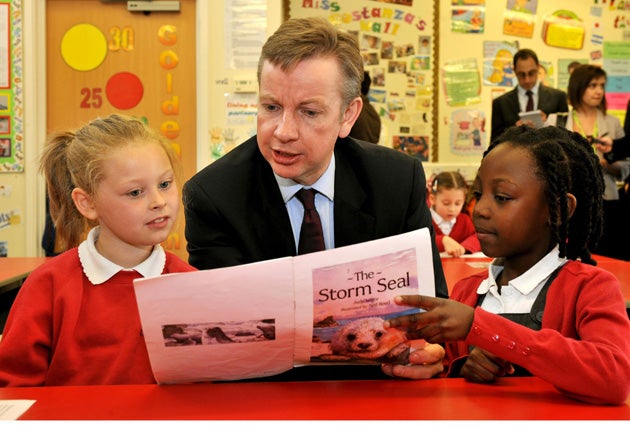Unions and academics oppose planned tests for six-year-olds

Your support helps us to tell the story
From reproductive rights to climate change to Big Tech, The Independent is on the ground when the story is developing. Whether it's investigating the financials of Elon Musk's pro-Trump PAC or producing our latest documentary, 'The A Word', which shines a light on the American women fighting for reproductive rights, we know how important it is to parse out the facts from the messaging.
At such a critical moment in US history, we need reporters on the ground. Your donation allows us to keep sending journalists to speak to both sides of the story.
The Independent is trusted by Americans across the entire political spectrum. And unlike many other quality news outlets, we choose not to lock Americans out of our reporting and analysis with paywalls. We believe quality journalism should be available to everyone, paid for by those who can afford it.
Your support makes all the difference.Plans for a new national reading test for six-year-olds will be included as part of a major shake-up of the education system in a White Paper to be published tomorrow.
All children will be tested at the end of their first year of compulsory schooling to assess whether they can read simple words. The checks, being piloted next year but rolled out nationally in 2012, are designed to tell teachers whether pupils need extra help to keep up – or if they are struggling to read.
Michael Gove, the Education Secretary, launched a consultation yesterday aimed at encouraging teachers to come forward with their views on how the new tests should be delivered.
However, there were early signs of opposition to the scheme from teachers' leaders and academics last night.
Mr Gove insisted the tests would be "a light-touch phonics-based check" on whether children had mastered the basics of reading. "It will be impossible to drill for and will be a true gauge of a child's reading skills," he said.
However, John Bangs, visiting professor at London University's Institute of Education, argued money would be best spent instead on ensuring teachers were adequately trained in how to assess children's reading skills. "The trouble with the phonics-based test is that it won't necessarily tell you anything about a child's overall vocabulary or whether they understand what they are reading," he added.
Professor Bangs added it was more important that schemes like the Reading Recovery programme – where pupils struggling to read receive specialist one-to-one tuition – were protected from spending cuts.
Christine Blower, the general secretary of the National Union of Teachers, said: "It seems to have escaped the Government's attention that teachers are assessing pupils all the time. Teachers and parents are more interested in the support available to children who are finding it difficult to learn how to read – the costs of introducing yet another test would be far better spent on investment in helping this group of children."
Martin Johnson, the deputy general secretary of the Association for Teachers and Lecturers, said: "After all [the Government's] talk of setting teachers free, it now wants to chain them further with another high-stakes test."
Labour introduced baseline tests for four- or five-year-olds designed to show their reading skill at the start of compulsory schooling just over a decade ago.
However, these were quietly dropped with the introduction of the foundation stage curriculum which outlined various skills pupils should have acquired by the time they started schooling – such as being able to communicate with classmates or count to 10.
At the heart of the controversy over the new tests is an argument over whether Mr Gove will deliver on his pledge to give teachers more freedom from government diktat and the national curriculum. He said he would like the national curriculum to be limited to spelling out what pupils should have learnt in the basics by the end of each key stage of education – seven, 11 and 14 and 16. Teachers' leaders argue that he jeopardises this pledge with every announcement that outlines things they must do.
Mr Gove argues the new tests are necessary because one in six seven-year-olds and one in five 11-year-olds still fail to reach the standard expected of them in reading.
Ofsted, the education standards watchdog, backed his plan. Christine Gilbert, its chief executive and chief inspector of schools, said: "A test for six-year-olds should not only prioritise reading for primary schools but should also enable early support to be given to schools who are finding it difficult to get all their children reading."
The testing timetable
* Today's children will first be observed by teachers at the ages of four and five on a range of issues, such as their communications skills and whether or not they can count to 10.
* Under the Government's new plans, they will also face a "phonics-based" reading check when they are six.
* They then have a national curriculum assessment in English and maths. These are no longer externally marked tests.
* At the age of 11, when they are preparing to leave primary school, the children sit external tests in English and maths for their national curriculum SATs.
* Once they reach secondary school, they sit their GCSEs at the age of 16, AS-levels (worth half an A-level) at 17 and then full A-levels at 18.
Join our commenting forum
Join thought-provoking conversations, follow other Independent readers and see their replies
Comments